Entrepreneurial Ventures, Skills and Business Impact Report
VerifiedAdded on 2020/11/23
|20
|5848
|233
Report
AI Summary
This report provides a comprehensive overview of entrepreneurial ventures, examining various types such as serial entrepreneurs, owner-managers, social entrepreneurs, and different venture settings like small businesses, social enterprises, and scalable start-ups. It explores the relationship between these ventures and entrepreneurial typologies, including lifestyle, social, and growth entrepreneurship. The report analyzes the similarities and differences between different types of ventures, highlighting the impact of small businesses on a country's economy, including job creation and contribution to the GDP. It also delves into the essential characteristics and skills of successful entrepreneurs, differentiating them from business managers, and explores the influence of personal background and experience on entrepreneurial success. The report also discusses the scope, development, and growth of entrepreneurial ventures and the motivational drivers of successful entrepreneurs. The report provides insights into the factors that can either hinder or foster entrepreneurial endeavors.

Entrepreneurship and
Small Business
Management
Small Business
Management
Paraphrase This Document
Need a fresh take? Get an instant paraphrase of this document with our AI Paraphraser
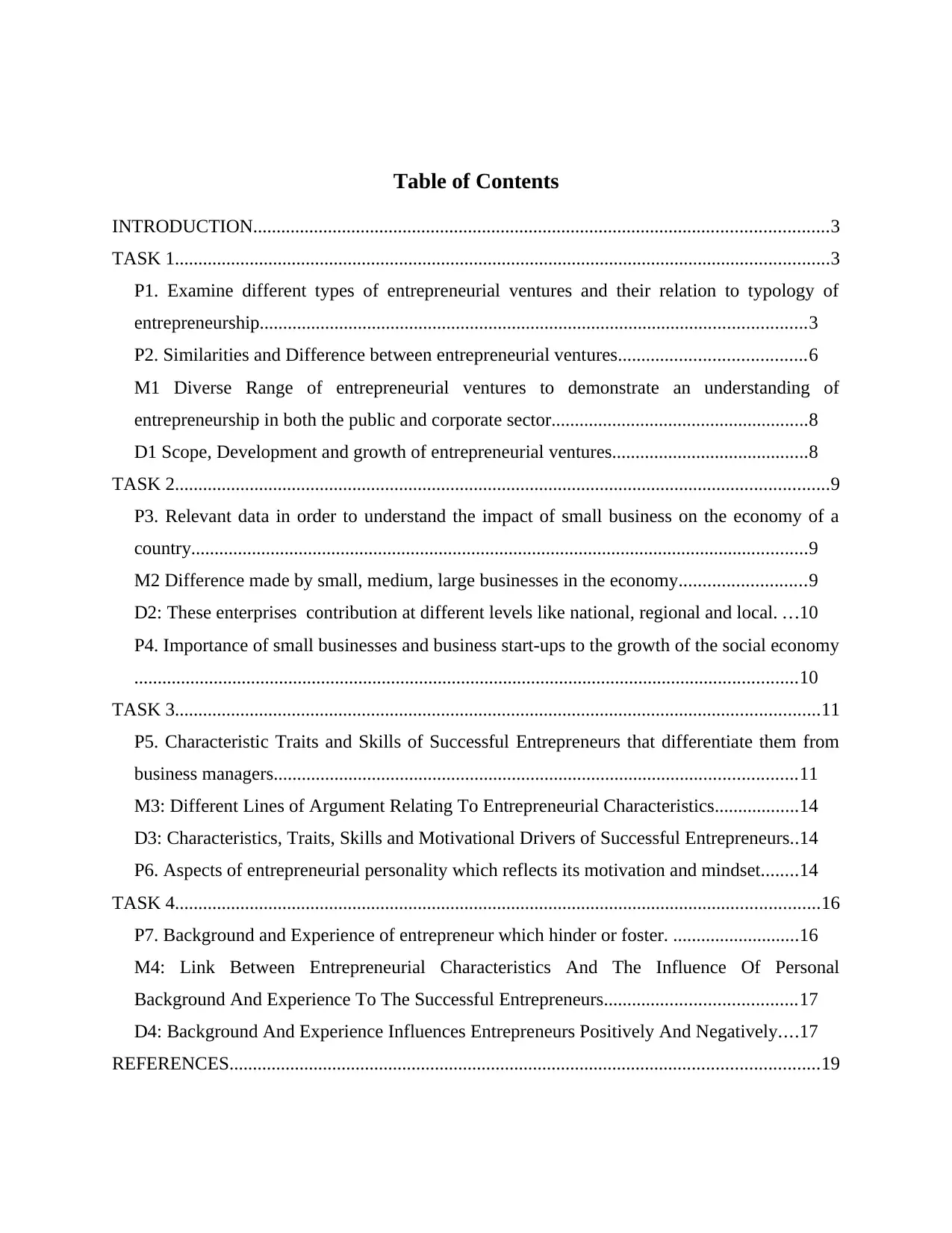
Table of Contents
INTRODUCTION...........................................................................................................................3
TASK 1............................................................................................................................................3
P1. Examine different types of entrepreneurial ventures and their relation to typology of
entrepreneurship.....................................................................................................................3
P2. Similarities and Difference between entrepreneurial ventures........................................6
M1 Diverse Range of entrepreneurial ventures to demonstrate an understanding of
entrepreneurship in both the public and corporate sector.......................................................8
D1 Scope, Development and growth of entrepreneurial ventures..........................................8
TASK 2............................................................................................................................................9
P3. Relevant data in order to understand the impact of small business on the economy of a
country....................................................................................................................................9
M2 Difference made by small, medium, large businesses in the economy...........................9
D2: These enterprises contribution at different levels like national, regional and local. ...10
P4. Importance of small businesses and business start-ups to the growth of the social economy
..............................................................................................................................................10
TASK 3..........................................................................................................................................11
P5. Characteristic Traits and Skills of Successful Entrepreneurs that differentiate them from
business managers................................................................................................................11
M3: Different Lines of Argument Relating To Entrepreneurial Characteristics..................14
D3: Characteristics, Traits, Skills and Motivational Drivers of Successful Entrepreneurs..14
P6. Aspects of entrepreneurial personality which reflects its motivation and mindset........14
TASK 4..........................................................................................................................................16
P7. Background and Experience of entrepreneur which hinder or foster. ...........................16
M4: Link Between Entrepreneurial Characteristics And The Influence Of Personal
Background And Experience To The Successful Entrepreneurs.........................................17
D4: Background And Experience Influences Entrepreneurs Positively And Negatively....17
REFERENCES..............................................................................................................................19
INTRODUCTION...........................................................................................................................3
TASK 1............................................................................................................................................3
P1. Examine different types of entrepreneurial ventures and their relation to typology of
entrepreneurship.....................................................................................................................3
P2. Similarities and Difference between entrepreneurial ventures........................................6
M1 Diverse Range of entrepreneurial ventures to demonstrate an understanding of
entrepreneurship in both the public and corporate sector.......................................................8
D1 Scope, Development and growth of entrepreneurial ventures..........................................8
TASK 2............................................................................................................................................9
P3. Relevant data in order to understand the impact of small business on the economy of a
country....................................................................................................................................9
M2 Difference made by small, medium, large businesses in the economy...........................9
D2: These enterprises contribution at different levels like national, regional and local. ...10
P4. Importance of small businesses and business start-ups to the growth of the social economy
..............................................................................................................................................10
TASK 3..........................................................................................................................................11
P5. Characteristic Traits and Skills of Successful Entrepreneurs that differentiate them from
business managers................................................................................................................11
M3: Different Lines of Argument Relating To Entrepreneurial Characteristics..................14
D3: Characteristics, Traits, Skills and Motivational Drivers of Successful Entrepreneurs..14
P6. Aspects of entrepreneurial personality which reflects its motivation and mindset........14
TASK 4..........................................................................................................................................16
P7. Background and Experience of entrepreneur which hinder or foster. ...........................16
M4: Link Between Entrepreneurial Characteristics And The Influence Of Personal
Background And Experience To The Successful Entrepreneurs.........................................17
D4: Background And Experience Influences Entrepreneurs Positively And Negatively....17
REFERENCES..............................................................................................................................19
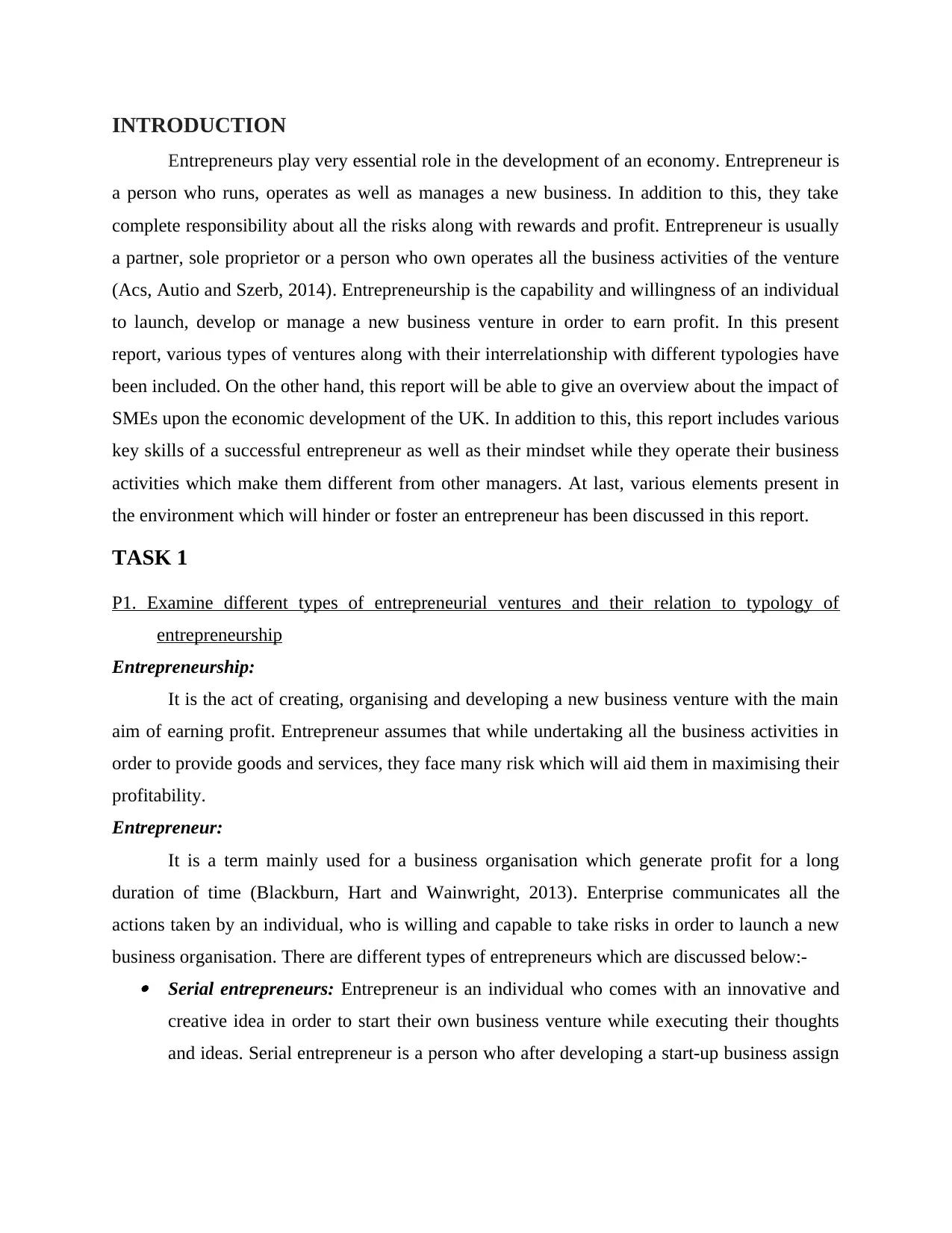
INTRODUCTION
Entrepreneurs play very essential role in the development of an economy. Entrepreneur is
a person who runs, operates as well as manages a new business. In addition to this, they take
complete responsibility about all the risks along with rewards and profit. Entrepreneur is usually
a partner, sole proprietor or a person who own operates all the business activities of the venture
(Acs, Autio and Szerb, 2014). Entrepreneurship is the capability and willingness of an individual
to launch, develop or manage a new business venture in order to earn profit. In this present
report, various types of ventures along with their interrelationship with different typologies have
been included. On the other hand, this report will be able to give an overview about the impact of
SMEs upon the economic development of the UK. In addition to this, this report includes various
key skills of a successful entrepreneur as well as their mindset while they operate their business
activities which make them different from other managers. At last, various elements present in
the environment which will hinder or foster an entrepreneur has been discussed in this report.
TASK 1
P1. Examine different types of entrepreneurial ventures and their relation to typology of
entrepreneurship
Entrepreneurship:
It is the act of creating, organising and developing a new business venture with the main
aim of earning profit. Entrepreneur assumes that while undertaking all the business activities in
order to provide goods and services, they face many risk which will aid them in maximising their
profitability.
Entrepreneur:
It is a term mainly used for a business organisation which generate profit for a long
duration of time (Blackburn, Hart and Wainwright, 2013). Enterprise communicates all the
actions taken by an individual, who is willing and capable to take risks in order to launch a new
business organisation. There are different types of entrepreneurs which are discussed below:- Serial entrepreneurs: Entrepreneur is an individual who comes with an innovative and
creative idea in order to start their own business venture while executing their thoughts
and ideas. Serial entrepreneur is a person who after developing a start-up business assign
Entrepreneurs play very essential role in the development of an economy. Entrepreneur is
a person who runs, operates as well as manages a new business. In addition to this, they take
complete responsibility about all the risks along with rewards and profit. Entrepreneur is usually
a partner, sole proprietor or a person who own operates all the business activities of the venture
(Acs, Autio and Szerb, 2014). Entrepreneurship is the capability and willingness of an individual
to launch, develop or manage a new business venture in order to earn profit. In this present
report, various types of ventures along with their interrelationship with different typologies have
been included. On the other hand, this report will be able to give an overview about the impact of
SMEs upon the economic development of the UK. In addition to this, this report includes various
key skills of a successful entrepreneur as well as their mindset while they operate their business
activities which make them different from other managers. At last, various elements present in
the environment which will hinder or foster an entrepreneur has been discussed in this report.
TASK 1
P1. Examine different types of entrepreneurial ventures and their relation to typology of
entrepreneurship
Entrepreneurship:
It is the act of creating, organising and developing a new business venture with the main
aim of earning profit. Entrepreneur assumes that while undertaking all the business activities in
order to provide goods and services, they face many risk which will aid them in maximising their
profitability.
Entrepreneur:
It is a term mainly used for a business organisation which generate profit for a long
duration of time (Blackburn, Hart and Wainwright, 2013). Enterprise communicates all the
actions taken by an individual, who is willing and capable to take risks in order to launch a new
business organisation. There are different types of entrepreneurs which are discussed below:- Serial entrepreneurs: Entrepreneur is an individual who comes with an innovative and
creative idea in order to start their own business venture while executing their thoughts
and ideas. Serial entrepreneur is a person who after developing a start-up business assign
⊘ This is a preview!⊘
Do you want full access?
Subscribe today to unlock all pages.

Trusted by 1+ million students worldwide
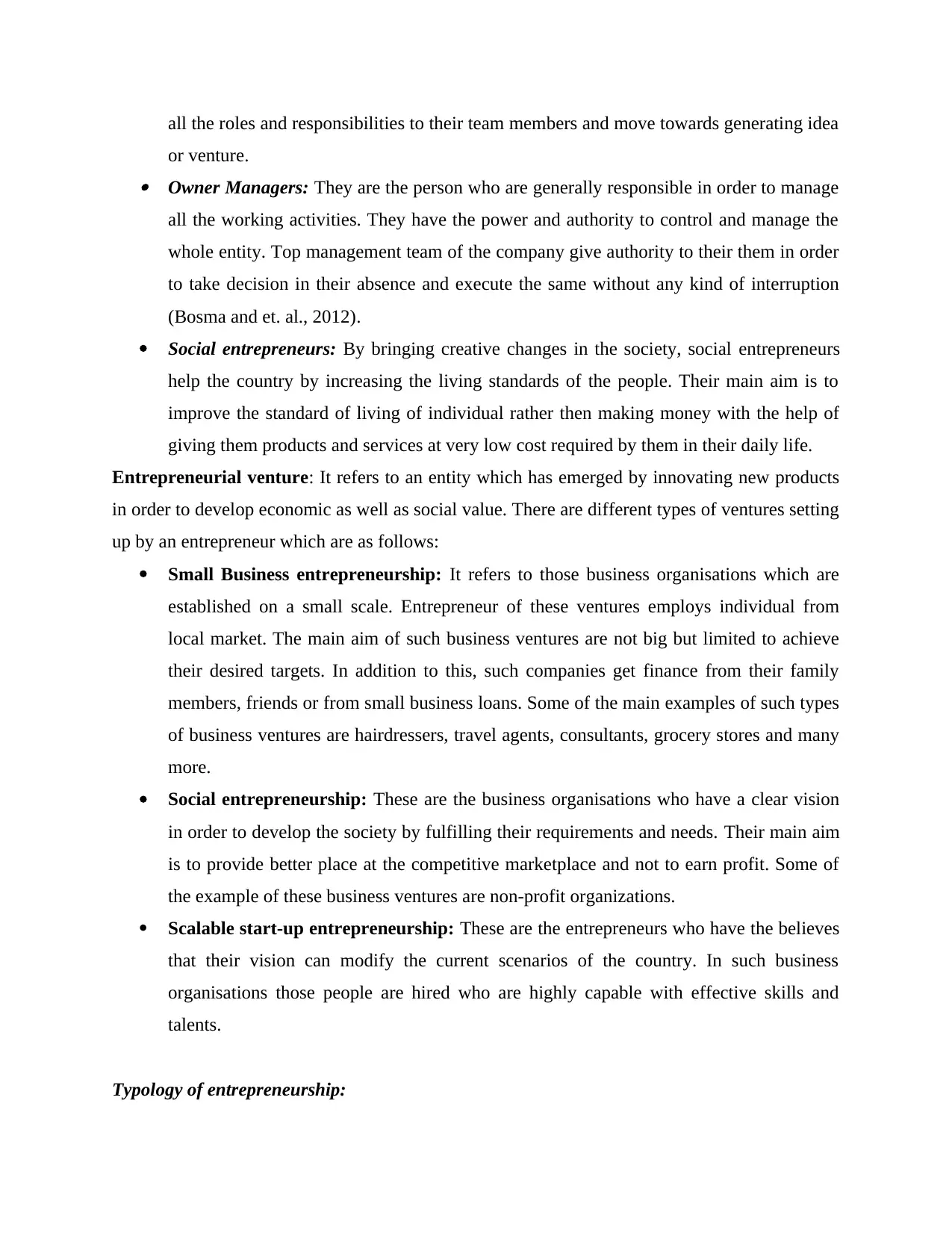
all the roles and responsibilities to their team members and move towards generating idea
or venture. Owner Managers: They are the person who are generally responsible in order to manage
all the working activities. They have the power and authority to control and manage the
whole entity. Top management team of the company give authority to their them in order
to take decision in their absence and execute the same without any kind of interruption
(Bosma and et. al., 2012).
Social entrepreneurs: By bringing creative changes in the society, social entrepreneurs
help the country by increasing the living standards of the people. Their main aim is to
improve the standard of living of individual rather then making money with the help of
giving them products and services at very low cost required by them in their daily life.
Entrepreneurial venture: It refers to an entity which has emerged by innovating new products
in order to develop economic as well as social value. There are different types of ventures setting
up by an entrepreneur which are as follows:
Small Business entrepreneurship: It refers to those business organisations which are
established on a small scale. Entrepreneur of these ventures employs individual from
local market. The main aim of such business ventures are not big but limited to achieve
their desired targets. In addition to this, such companies get finance from their family
members, friends or from small business loans. Some of the main examples of such types
of business ventures are hairdressers, travel agents, consultants, grocery stores and many
more.
Social entrepreneurship: These are the business organisations who have a clear vision
in order to develop the society by fulfilling their requirements and needs. Their main aim
is to provide better place at the competitive marketplace and not to earn profit. Some of
the example of these business ventures are non-profit organizations.
Scalable start-up entrepreneurship: These are the entrepreneurs who have the believes
that their vision can modify the current scenarios of the country. In such business
organisations those people are hired who are highly capable with effective skills and
talents.
Typology of entrepreneurship:
or venture. Owner Managers: They are the person who are generally responsible in order to manage
all the working activities. They have the power and authority to control and manage the
whole entity. Top management team of the company give authority to their them in order
to take decision in their absence and execute the same without any kind of interruption
(Bosma and et. al., 2012).
Social entrepreneurs: By bringing creative changes in the society, social entrepreneurs
help the country by increasing the living standards of the people. Their main aim is to
improve the standard of living of individual rather then making money with the help of
giving them products and services at very low cost required by them in their daily life.
Entrepreneurial venture: It refers to an entity which has emerged by innovating new products
in order to develop economic as well as social value. There are different types of ventures setting
up by an entrepreneur which are as follows:
Small Business entrepreneurship: It refers to those business organisations which are
established on a small scale. Entrepreneur of these ventures employs individual from
local market. The main aim of such business ventures are not big but limited to achieve
their desired targets. In addition to this, such companies get finance from their family
members, friends or from small business loans. Some of the main examples of such types
of business ventures are hairdressers, travel agents, consultants, grocery stores and many
more.
Social entrepreneurship: These are the business organisations who have a clear vision
in order to develop the society by fulfilling their requirements and needs. Their main aim
is to provide better place at the competitive marketplace and not to earn profit. Some of
the example of these business ventures are non-profit organizations.
Scalable start-up entrepreneurship: These are the entrepreneurs who have the believes
that their vision can modify the current scenarios of the country. In such business
organisations those people are hired who are highly capable with effective skills and
talents.
Typology of entrepreneurship:
Paraphrase This Document
Need a fresh take? Get an instant paraphrase of this document with our AI Paraphraser
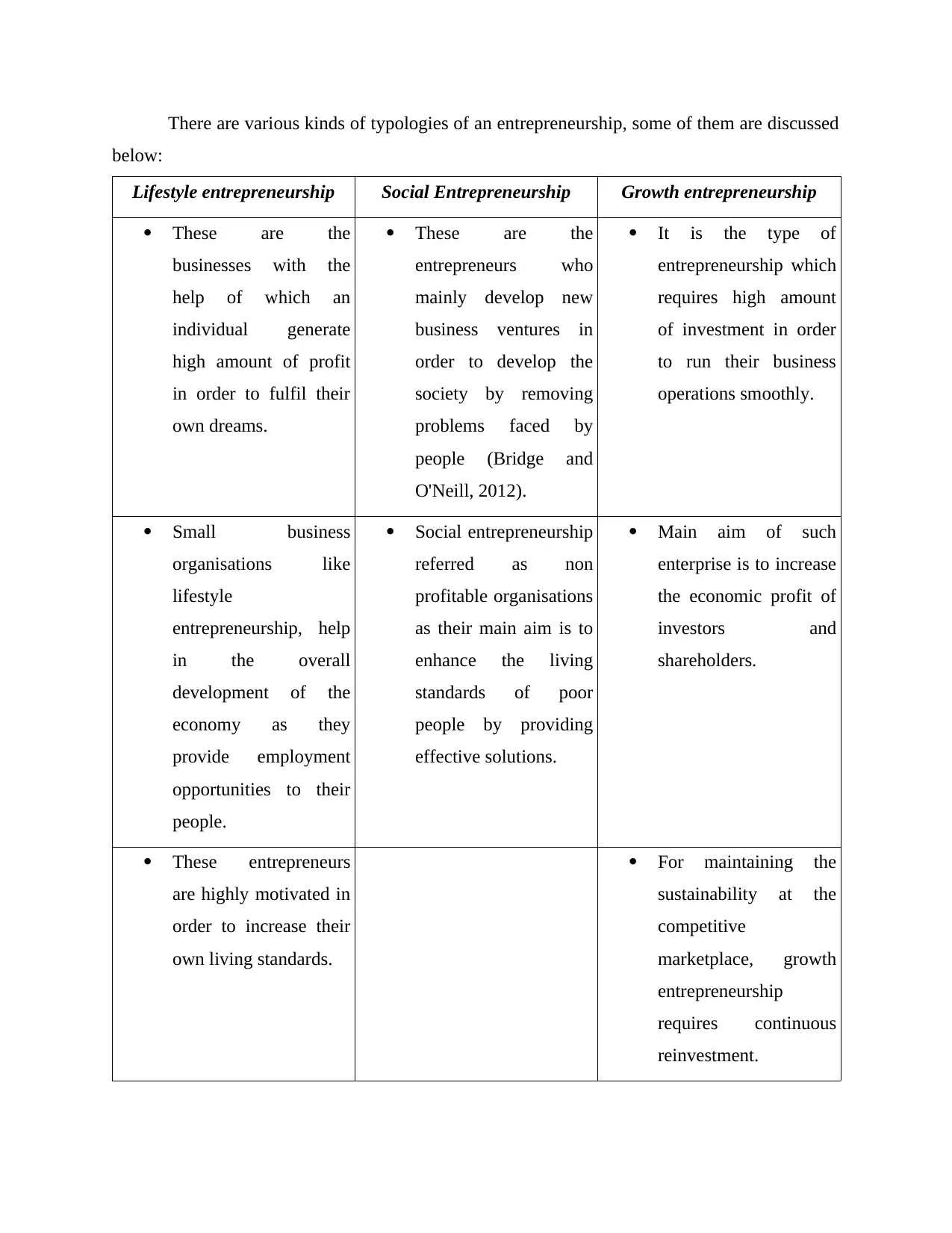
There are various kinds of typologies of an entrepreneurship, some of them are discussed
below:
Lifestyle entrepreneurship Social Entrepreneurship Growth entrepreneurship
These are the
businesses with the
help of which an
individual generate
high amount of profit
in order to fulfil their
own dreams.
These are the
entrepreneurs who
mainly develop new
business ventures in
order to develop the
society by removing
problems faced by
people (Bridge and
O'Neill, 2012).
It is the type of
entrepreneurship which
requires high amount
of investment in order
to run their business
operations smoothly.
Small business
organisations like
lifestyle
entrepreneurship, help
in the overall
development of the
economy as they
provide employment
opportunities to their
people.
Social entrepreneurship
referred as non
profitable organisations
as their main aim is to
enhance the living
standards of poor
people by providing
effective solutions.
Main aim of such
enterprise is to increase
the economic profit of
investors and
shareholders.
These entrepreneurs
are highly motivated in
order to increase their
own living standards.
For maintaining the
sustainability at the
competitive
marketplace, growth
entrepreneurship
requires continuous
reinvestment.
below:
Lifestyle entrepreneurship Social Entrepreneurship Growth entrepreneurship
These are the
businesses with the
help of which an
individual generate
high amount of profit
in order to fulfil their
own dreams.
These are the
entrepreneurs who
mainly develop new
business ventures in
order to develop the
society by removing
problems faced by
people (Bridge and
O'Neill, 2012).
It is the type of
entrepreneurship which
requires high amount
of investment in order
to run their business
operations smoothly.
Small business
organisations like
lifestyle
entrepreneurship, help
in the overall
development of the
economy as they
provide employment
opportunities to their
people.
Social entrepreneurship
referred as non
profitable organisations
as their main aim is to
enhance the living
standards of poor
people by providing
effective solutions.
Main aim of such
enterprise is to increase
the economic profit of
investors and
shareholders.
These entrepreneurs
are highly motivated in
order to increase their
own living standards.
For maintaining the
sustainability at the
competitive
marketplace, growth
entrepreneurship
requires continuous
reinvestment.
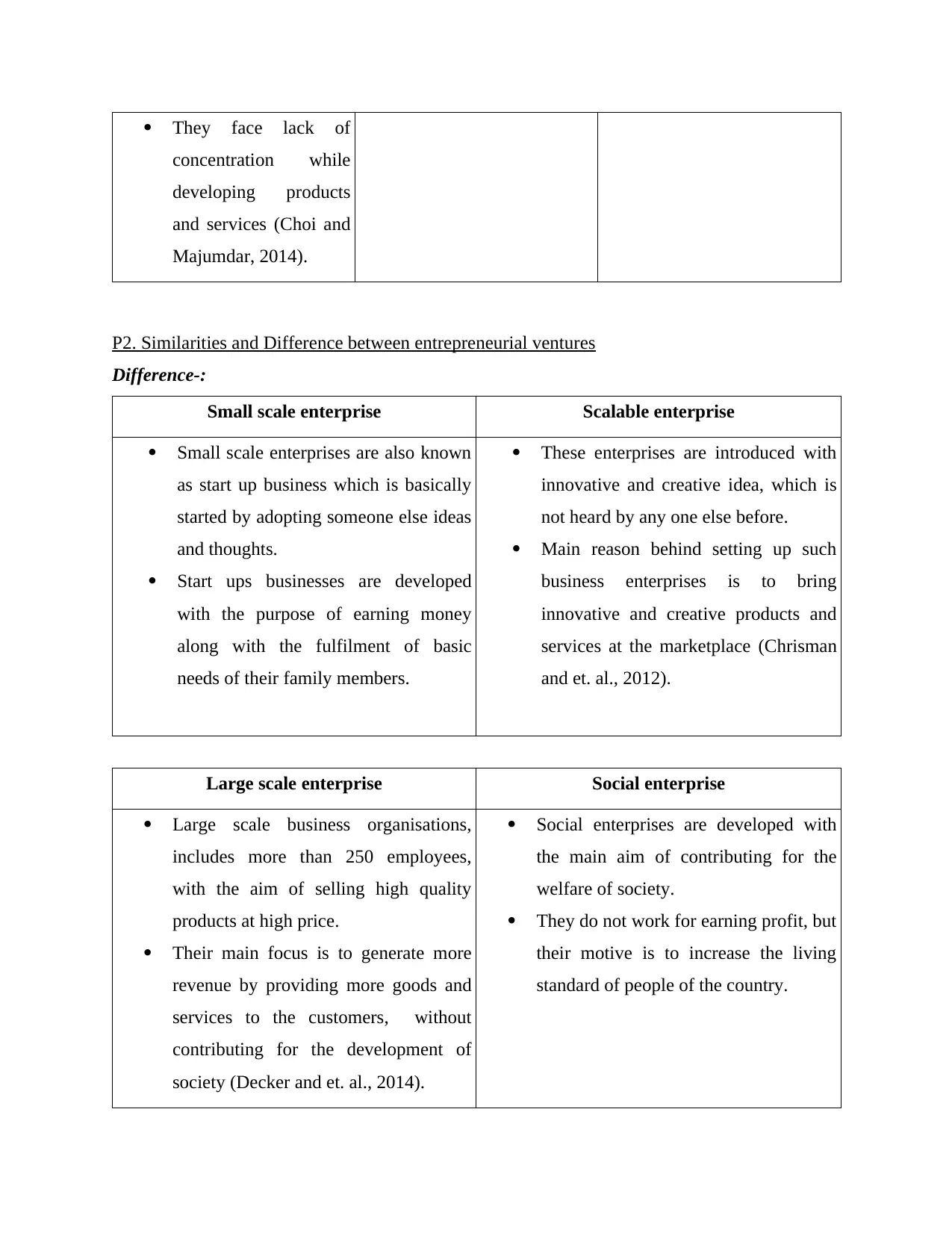
They face lack of
concentration while
developing products
and services (Choi and
Majumdar, 2014).
P2. Similarities and Difference between entrepreneurial ventures
Difference-:
Small scale enterprise Scalable enterprise
Small scale enterprises are also known
as start up business which is basically
started by adopting someone else ideas
and thoughts.
Start ups businesses are developed
with the purpose of earning money
along with the fulfilment of basic
needs of their family members.
These enterprises are introduced with
innovative and creative idea, which is
not heard by any one else before.
Main reason behind setting up such
business enterprises is to bring
innovative and creative products and
services at the marketplace (Chrisman
and et. al., 2012).
Large scale enterprise Social enterprise
Large scale business organisations,
includes more than 250 employees,
with the aim of selling high quality
products at high price.
Their main focus is to generate more
revenue by providing more goods and
services to the customers, without
contributing for the development of
society (Decker and et. al., 2014).
Social enterprises are developed with
the main aim of contributing for the
welfare of society.
They do not work for earning profit, but
their motive is to increase the living
standard of people of the country.
concentration while
developing products
and services (Choi and
Majumdar, 2014).
P2. Similarities and Difference between entrepreneurial ventures
Difference-:
Small scale enterprise Scalable enterprise
Small scale enterprises are also known
as start up business which is basically
started by adopting someone else ideas
and thoughts.
Start ups businesses are developed
with the purpose of earning money
along with the fulfilment of basic
needs of their family members.
These enterprises are introduced with
innovative and creative idea, which is
not heard by any one else before.
Main reason behind setting up such
business enterprises is to bring
innovative and creative products and
services at the marketplace (Chrisman
and et. al., 2012).
Large scale enterprise Social enterprise
Large scale business organisations,
includes more than 250 employees,
with the aim of selling high quality
products at high price.
Their main focus is to generate more
revenue by providing more goods and
services to the customers, without
contributing for the development of
society (Decker and et. al., 2014).
Social enterprises are developed with
the main aim of contributing for the
welfare of society.
They do not work for earning profit, but
their motive is to increase the living
standard of people of the country.
⊘ This is a preview!⊘
Do you want full access?
Subscribe today to unlock all pages.

Trusted by 1+ million students worldwide
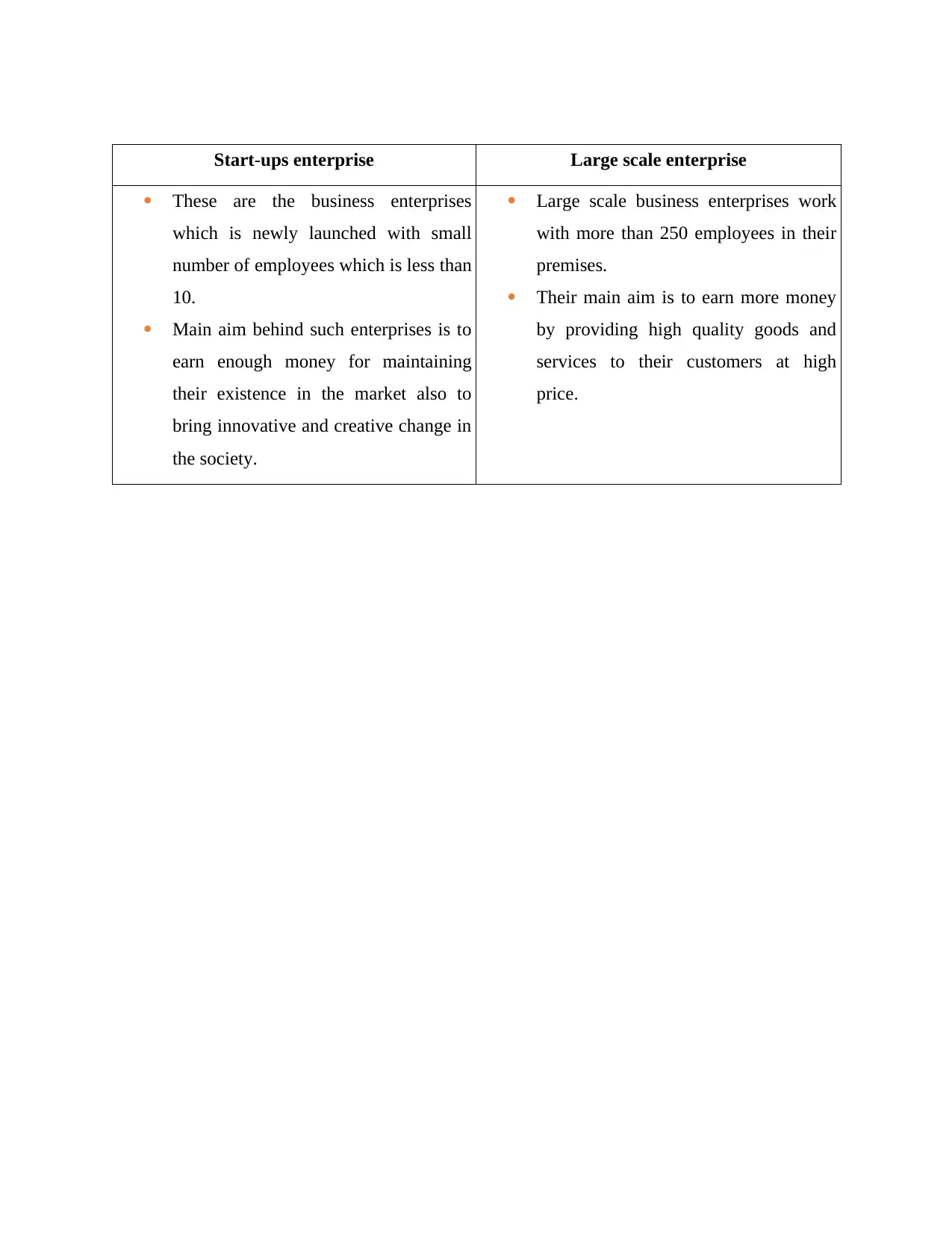
Start-ups enterprise Large scale enterprise
These are the business enterprises
which is newly launched with small
number of employees which is less than
10.
Main aim behind such enterprises is to
earn enough money for maintaining
their existence in the market also to
bring innovative and creative change in
the society.
Large scale business enterprises work
with more than 250 employees in their
premises.
Their main aim is to earn more money
by providing high quality goods and
services to their customers at high
price.
These are the business enterprises
which is newly launched with small
number of employees which is less than
10.
Main aim behind such enterprises is to
earn enough money for maintaining
their existence in the market also to
bring innovative and creative change in
the society.
Large scale business enterprises work
with more than 250 employees in their
premises.
Their main aim is to earn more money
by providing high quality goods and
services to their customers at high
price.
Paraphrase This Document
Need a fresh take? Get an instant paraphrase of this document with our AI Paraphraser
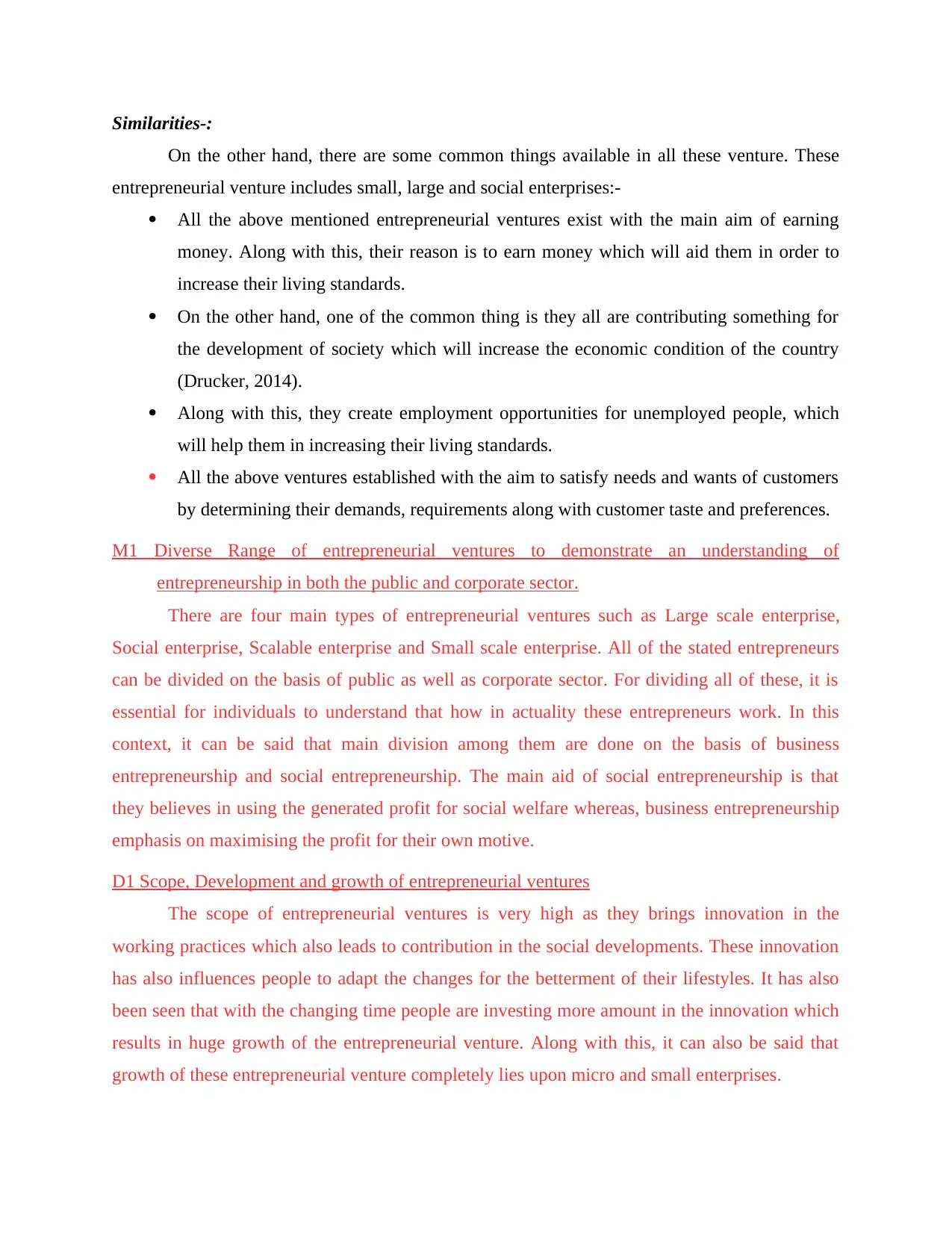
Similarities-:
On the other hand, there are some common things available in all these venture. These
entrepreneurial venture includes small, large and social enterprises:-
All the above mentioned entrepreneurial ventures exist with the main aim of earning
money. Along with this, their reason is to earn money which will aid them in order to
increase their living standards.
On the other hand, one of the common thing is they all are contributing something for
the development of society which will increase the economic condition of the country
(Drucker, 2014).
Along with this, they create employment opportunities for unemployed people, which
will help them in increasing their living standards.
All the above ventures established with the aim to satisfy needs and wants of customers
by determining their demands, requirements along with customer taste and preferences.
M1 Diverse Range of entrepreneurial ventures to demonstrate an understanding of
entrepreneurship in both the public and corporate sector.
There are four main types of entrepreneurial ventures such as Large scale enterprise,
Social enterprise, Scalable enterprise and Small scale enterprise. All of the stated entrepreneurs
can be divided on the basis of public as well as corporate sector. For dividing all of these, it is
essential for individuals to understand that how in actuality these entrepreneurs work. In this
context, it can be said that main division among them are done on the basis of business
entrepreneurship and social entrepreneurship. The main aid of social entrepreneurship is that
they believes in using the generated profit for social welfare whereas, business entrepreneurship
emphasis on maximising the profit for their own motive.
D1 Scope, Development and growth of entrepreneurial ventures
The scope of entrepreneurial ventures is very high as they brings innovation in the
working practices which also leads to contribution in the social developments. These innovation
has also influences people to adapt the changes for the betterment of their lifestyles. It has also
been seen that with the changing time people are investing more amount in the innovation which
results in huge growth of the entrepreneurial venture. Along with this, it can also be said that
growth of these entrepreneurial venture completely lies upon micro and small enterprises.
On the other hand, there are some common things available in all these venture. These
entrepreneurial venture includes small, large and social enterprises:-
All the above mentioned entrepreneurial ventures exist with the main aim of earning
money. Along with this, their reason is to earn money which will aid them in order to
increase their living standards.
On the other hand, one of the common thing is they all are contributing something for
the development of society which will increase the economic condition of the country
(Drucker, 2014).
Along with this, they create employment opportunities for unemployed people, which
will help them in increasing their living standards.
All the above ventures established with the aim to satisfy needs and wants of customers
by determining their demands, requirements along with customer taste and preferences.
M1 Diverse Range of entrepreneurial ventures to demonstrate an understanding of
entrepreneurship in both the public and corporate sector.
There are four main types of entrepreneurial ventures such as Large scale enterprise,
Social enterprise, Scalable enterprise and Small scale enterprise. All of the stated entrepreneurs
can be divided on the basis of public as well as corporate sector. For dividing all of these, it is
essential for individuals to understand that how in actuality these entrepreneurs work. In this
context, it can be said that main division among them are done on the basis of business
entrepreneurship and social entrepreneurship. The main aid of social entrepreneurship is that
they believes in using the generated profit for social welfare whereas, business entrepreneurship
emphasis on maximising the profit for their own motive.
D1 Scope, Development and growth of entrepreneurial ventures
The scope of entrepreneurial ventures is very high as they brings innovation in the
working practices which also leads to contribution in the social developments. These innovation
has also influences people to adapt the changes for the betterment of their lifestyles. It has also
been seen that with the changing time people are investing more amount in the innovation which
results in huge growth of the entrepreneurial venture. Along with this, it can also be said that
growth of these entrepreneurial venture completely lies upon micro and small enterprises.
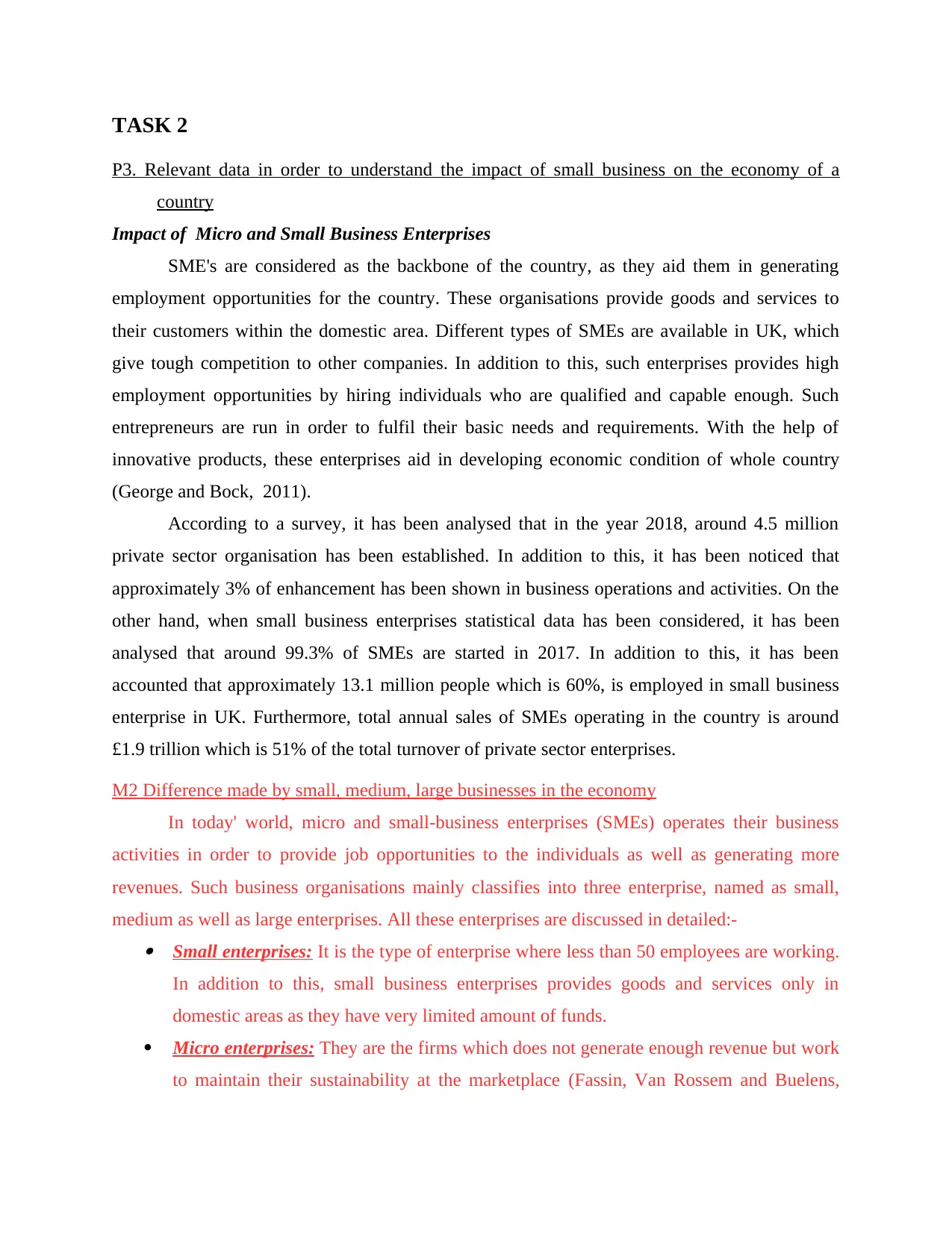
TASK 2
P3. Relevant data in order to understand the impact of small business on the economy of a
country
Impact of Micro and Small Business Enterprises
SME's are considered as the backbone of the country, as they aid them in generating
employment opportunities for the country. These organisations provide goods and services to
their customers within the domestic area. Different types of SMEs are available in UK, which
give tough competition to other companies. In addition to this, such enterprises provides high
employment opportunities by hiring individuals who are qualified and capable enough. Such
entrepreneurs are run in order to fulfil their basic needs and requirements. With the help of
innovative products, these enterprises aid in developing economic condition of whole country
(George and Bock, 2011).
According to a survey, it has been analysed that in the year 2018, around 4.5 million
private sector organisation has been established. In addition to this, it has been noticed that
approximately 3% of enhancement has been shown in business operations and activities. On the
other hand, when small business enterprises statistical data has been considered, it has been
analysed that around 99.3% of SMEs are started in 2017. In addition to this, it has been
accounted that approximately 13.1 million people which is 60%, is employed in small business
enterprise in UK. Furthermore, total annual sales of SMEs operating in the country is around
£1.9 trillion which is 51% of the total turnover of private sector enterprises.
M2 Difference made by small, medium, large businesses in the economy
In today' world, micro and small-business enterprises (SMEs) operates their business
activities in order to provide job opportunities to the individuals as well as generating more
revenues. Such business organisations mainly classifies into three enterprise, named as small,
medium as well as large enterprises. All these enterprises are discussed in detailed:- Small enterprises: It is the type of enterprise where less than 50 employees are working.
In addition to this, small business enterprises provides goods and services only in
domestic areas as they have very limited amount of funds.
Micro enterprises: They are the firms which does not generate enough revenue but work
to maintain their sustainability at the marketplace (Fassin, Van Rossem and Buelens,
P3. Relevant data in order to understand the impact of small business on the economy of a
country
Impact of Micro and Small Business Enterprises
SME's are considered as the backbone of the country, as they aid them in generating
employment opportunities for the country. These organisations provide goods and services to
their customers within the domestic area. Different types of SMEs are available in UK, which
give tough competition to other companies. In addition to this, such enterprises provides high
employment opportunities by hiring individuals who are qualified and capable enough. Such
entrepreneurs are run in order to fulfil their basic needs and requirements. With the help of
innovative products, these enterprises aid in developing economic condition of whole country
(George and Bock, 2011).
According to a survey, it has been analysed that in the year 2018, around 4.5 million
private sector organisation has been established. In addition to this, it has been noticed that
approximately 3% of enhancement has been shown in business operations and activities. On the
other hand, when small business enterprises statistical data has been considered, it has been
analysed that around 99.3% of SMEs are started in 2017. In addition to this, it has been
accounted that approximately 13.1 million people which is 60%, is employed in small business
enterprise in UK. Furthermore, total annual sales of SMEs operating in the country is around
£1.9 trillion which is 51% of the total turnover of private sector enterprises.
M2 Difference made by small, medium, large businesses in the economy
In today' world, micro and small-business enterprises (SMEs) operates their business
activities in order to provide job opportunities to the individuals as well as generating more
revenues. Such business organisations mainly classifies into three enterprise, named as small,
medium as well as large enterprises. All these enterprises are discussed in detailed:- Small enterprises: It is the type of enterprise where less than 50 employees are working.
In addition to this, small business enterprises provides goods and services only in
domestic areas as they have very limited amount of funds.
Micro enterprises: They are the firms which does not generate enough revenue but work
to maintain their sustainability at the marketplace (Fassin, Van Rossem and Buelens,
⊘ This is a preview!⊘
Do you want full access?
Subscribe today to unlock all pages.

Trusted by 1+ million students worldwide
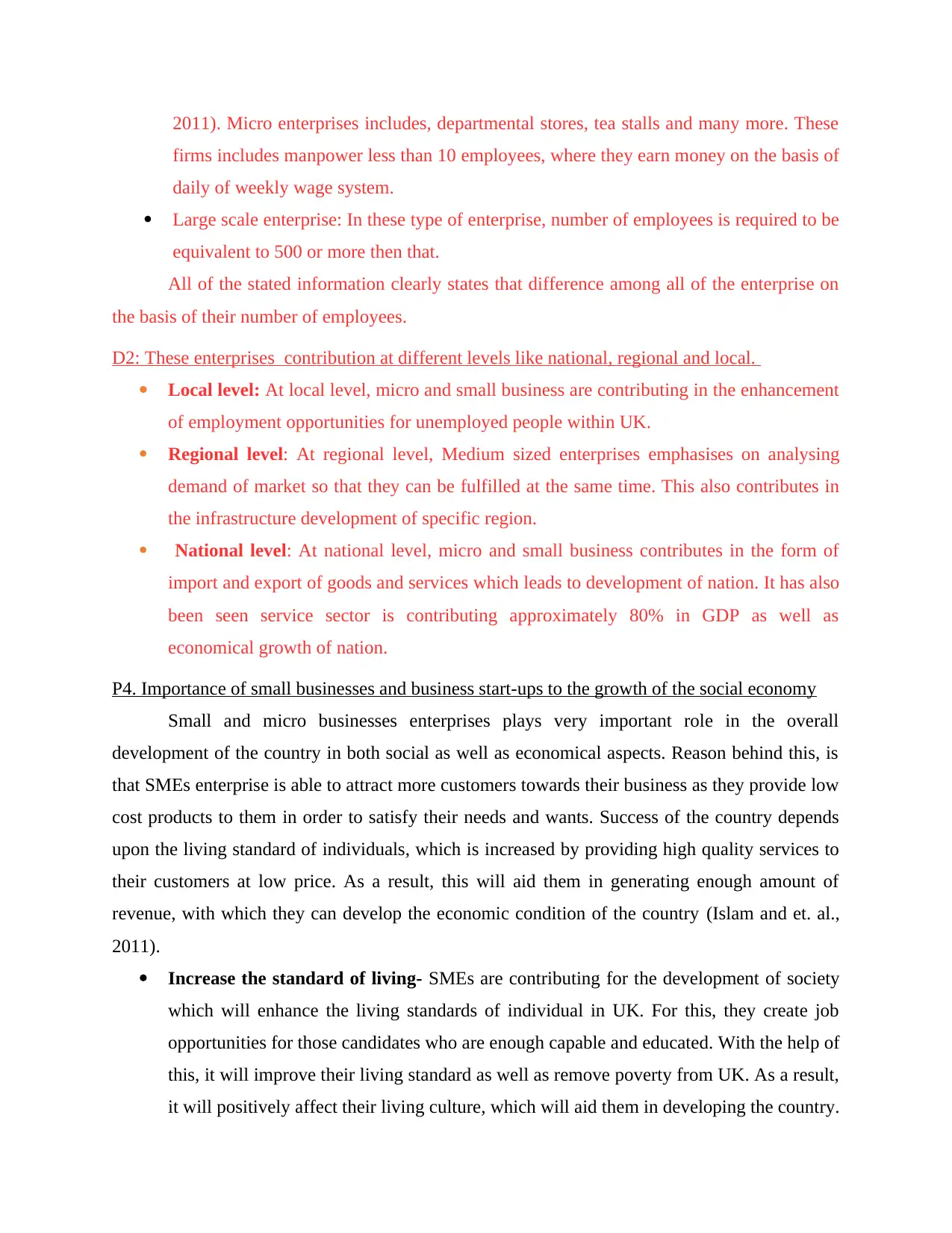
2011). Micro enterprises includes, departmental stores, tea stalls and many more. These
firms includes manpower less than 10 employees, where they earn money on the basis of
daily of weekly wage system.
Large scale enterprise: In these type of enterprise, number of employees is required to be
equivalent to 500 or more then that.
All of the stated information clearly states that difference among all of the enterprise on
the basis of their number of employees.
D2: These enterprises contribution at different levels like national, regional and local.
Local level: At local level, micro and small business are contributing in the enhancement
of employment opportunities for unemployed people within UK.
Regional level: At regional level, Medium sized enterprises emphasises on analysing
demand of market so that they can be fulfilled at the same time. This also contributes in
the infrastructure development of specific region.
National level: At national level, micro and small business contributes in the form of
import and export of goods and services which leads to development of nation. It has also
been seen service sector is contributing approximately 80% in GDP as well as
economical growth of nation.
P4. Importance of small businesses and business start-ups to the growth of the social economy
Small and micro businesses enterprises plays very important role in the overall
development of the country in both social as well as economical aspects. Reason behind this, is
that SMEs enterprise is able to attract more customers towards their business as they provide low
cost products to them in order to satisfy their needs and wants. Success of the country depends
upon the living standard of individuals, which is increased by providing high quality services to
their customers at low price. As a result, this will aid them in generating enough amount of
revenue, with which they can develop the economic condition of the country (Islam and et. al.,
2011).
Increase the standard of living- SMEs are contributing for the development of society
which will enhance the living standards of individual in UK. For this, they create job
opportunities for those candidates who are enough capable and educated. With the help of
this, it will improve their living standard as well as remove poverty from UK. As a result,
it will positively affect their living culture, which will aid them in developing the country.
firms includes manpower less than 10 employees, where they earn money on the basis of
daily of weekly wage system.
Large scale enterprise: In these type of enterprise, number of employees is required to be
equivalent to 500 or more then that.
All of the stated information clearly states that difference among all of the enterprise on
the basis of their number of employees.
D2: These enterprises contribution at different levels like national, regional and local.
Local level: At local level, micro and small business are contributing in the enhancement
of employment opportunities for unemployed people within UK.
Regional level: At regional level, Medium sized enterprises emphasises on analysing
demand of market so that they can be fulfilled at the same time. This also contributes in
the infrastructure development of specific region.
National level: At national level, micro and small business contributes in the form of
import and export of goods and services which leads to development of nation. It has also
been seen service sector is contributing approximately 80% in GDP as well as
economical growth of nation.
P4. Importance of small businesses and business start-ups to the growth of the social economy
Small and micro businesses enterprises plays very important role in the overall
development of the country in both social as well as economical aspects. Reason behind this, is
that SMEs enterprise is able to attract more customers towards their business as they provide low
cost products to them in order to satisfy their needs and wants. Success of the country depends
upon the living standard of individuals, which is increased by providing high quality services to
their customers at low price. As a result, this will aid them in generating enough amount of
revenue, with which they can develop the economic condition of the country (Islam and et. al.,
2011).
Increase the standard of living- SMEs are contributing for the development of society
which will enhance the living standards of individual in UK. For this, they create job
opportunities for those candidates who are enough capable and educated. With the help of
this, it will improve their living standard as well as remove poverty from UK. As a result,
it will positively affect their living culture, which will aid them in developing the country.
Paraphrase This Document
Need a fresh take? Get an instant paraphrase of this document with our AI Paraphraser
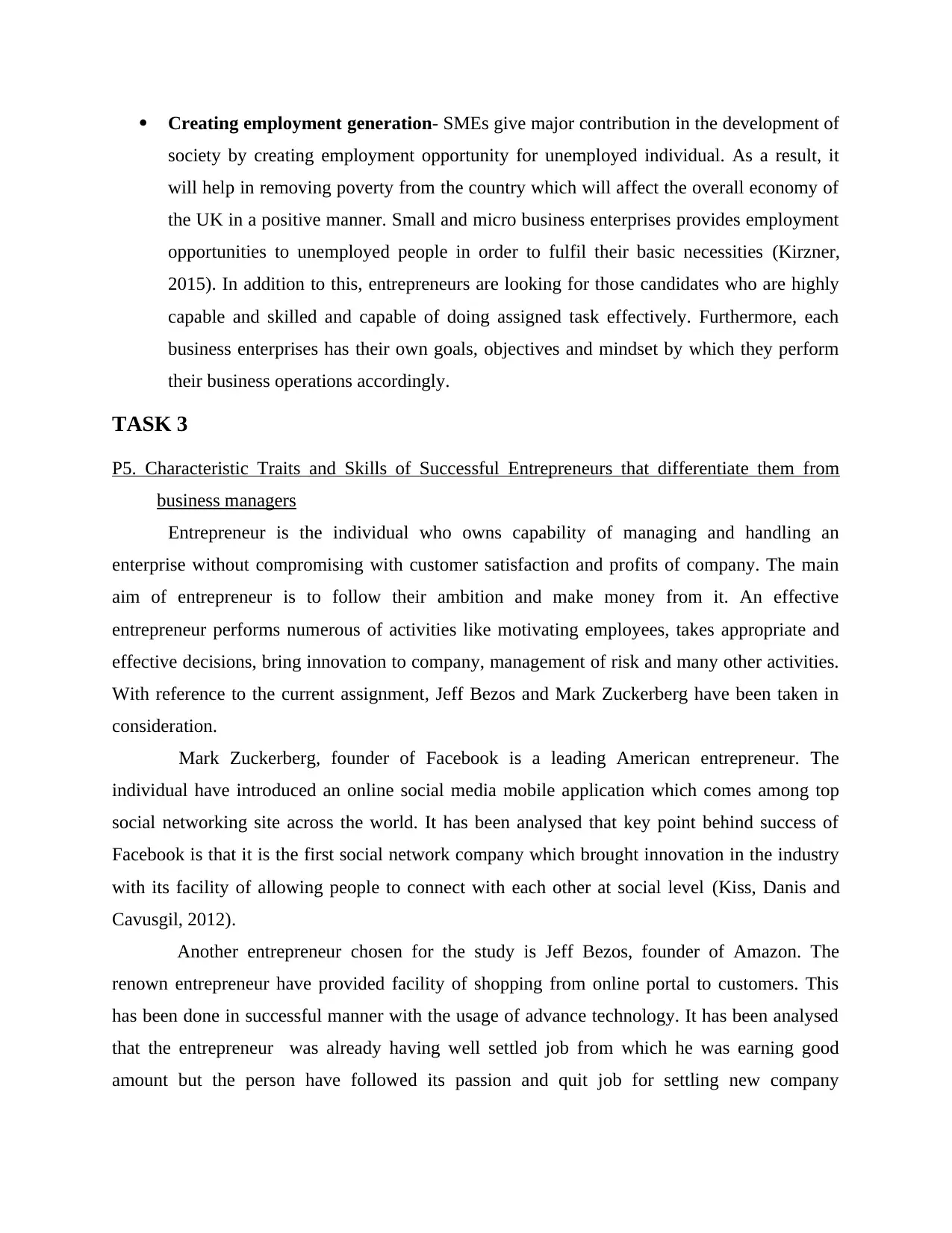
Creating employment generation- SMEs give major contribution in the development of
society by creating employment opportunity for unemployed individual. As a result, it
will help in removing poverty from the country which will affect the overall economy of
the UK in a positive manner. Small and micro business enterprises provides employment
opportunities to unemployed people in order to fulfil their basic necessities (Kirzner,
2015). In addition to this, entrepreneurs are looking for those candidates who are highly
capable and skilled and capable of doing assigned task effectively. Furthermore, each
business enterprises has their own goals, objectives and mindset by which they perform
their business operations accordingly.
TASK 3
P5. Characteristic Traits and Skills of Successful Entrepreneurs that differentiate them from
business managers
Entrepreneur is the individual who owns capability of managing and handling an
enterprise without compromising with customer satisfaction and profits of company. The main
aim of entrepreneur is to follow their ambition and make money from it. An effective
entrepreneur performs numerous of activities like motivating employees, takes appropriate and
effective decisions, bring innovation to company, management of risk and many other activities.
With reference to the current assignment, Jeff Bezos and Mark Zuckerberg have been taken in
consideration.
Mark Zuckerberg, founder of Facebook is a leading American entrepreneur. The
individual have introduced an online social media mobile application which comes among top
social networking site across the world. It has been analysed that key point behind success of
Facebook is that it is the first social network company which brought innovation in the industry
with its facility of allowing people to connect with each other at social level (Kiss, Danis and
Cavusgil, 2012).
Another entrepreneur chosen for the study is Jeff Bezos, founder of Amazon. The
renown entrepreneur have provided facility of shopping from online portal to customers. This
has been done in successful manner with the usage of advance technology. It has been analysed
that the entrepreneur was already having well settled job from which he was earning good
amount but the person have followed its passion and quit job for settling new company
society by creating employment opportunity for unemployed individual. As a result, it
will help in removing poverty from the country which will affect the overall economy of
the UK in a positive manner. Small and micro business enterprises provides employment
opportunities to unemployed people in order to fulfil their basic necessities (Kirzner,
2015). In addition to this, entrepreneurs are looking for those candidates who are highly
capable and skilled and capable of doing assigned task effectively. Furthermore, each
business enterprises has their own goals, objectives and mindset by which they perform
their business operations accordingly.
TASK 3
P5. Characteristic Traits and Skills of Successful Entrepreneurs that differentiate them from
business managers
Entrepreneur is the individual who owns capability of managing and handling an
enterprise without compromising with customer satisfaction and profits of company. The main
aim of entrepreneur is to follow their ambition and make money from it. An effective
entrepreneur performs numerous of activities like motivating employees, takes appropriate and
effective decisions, bring innovation to company, management of risk and many other activities.
With reference to the current assignment, Jeff Bezos and Mark Zuckerberg have been taken in
consideration.
Mark Zuckerberg, founder of Facebook is a leading American entrepreneur. The
individual have introduced an online social media mobile application which comes among top
social networking site across the world. It has been analysed that key point behind success of
Facebook is that it is the first social network company which brought innovation in the industry
with its facility of allowing people to connect with each other at social level (Kiss, Danis and
Cavusgil, 2012).
Another entrepreneur chosen for the study is Jeff Bezos, founder of Amazon. The
renown entrepreneur have provided facility of shopping from online portal to customers. This
has been done in successful manner with the usage of advance technology. It has been analysed
that the entrepreneur was already having well settled job from which he was earning good
amount but the person have followed its passion and quit job for settling new company
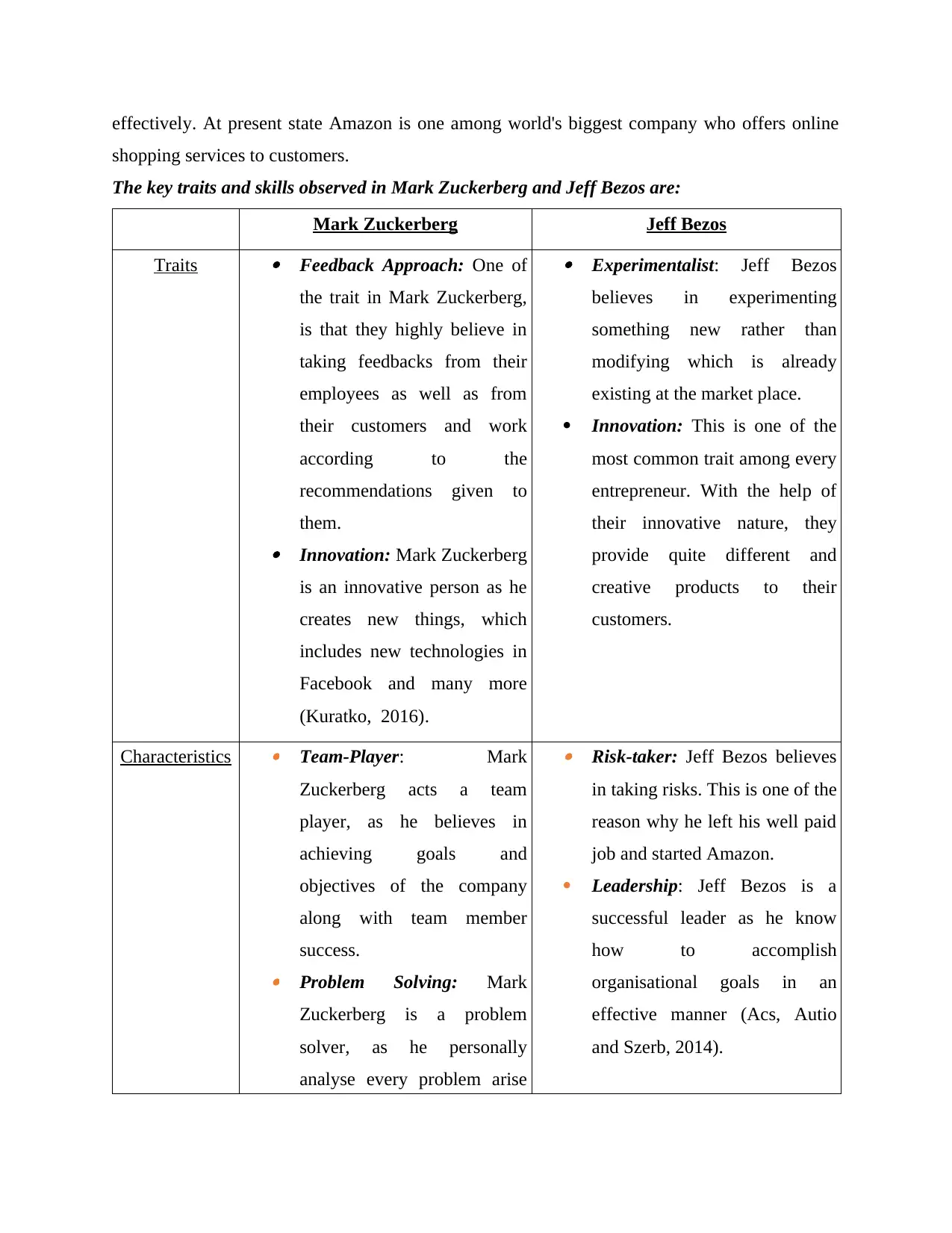
effectively. At present state Amazon is one among world's biggest company who offers online
shopping services to customers.
The key traits and skills observed in Mark Zuckerberg and Jeff Bezos are:
Mark Zuckerberg Jeff Bezos
Traits
Feedback Approach: One of
the trait in Mark Zuckerberg,
is that they highly believe in
taking feedbacks from their
employees as well as from
their customers and work
according to the
recommendations given to
them.
Innovation: Mark Zuckerberg
is an innovative person as he
creates new things, which
includes new technologies in
Facebook and many more
(Kuratko, 2016).
Experimentalist: Jeff Bezos
believes in experimenting
something new rather than
modifying which is already
existing at the market place.
Innovation: This is one of the
most common trait among every
entrepreneur. With the help of
their innovative nature, they
provide quite different and
creative products to their
customers.
Characteristics
Team-Player: Mark
Zuckerberg acts a team
player, as he believes in
achieving goals and
objectives of the company
along with team member
success.
Problem Solving: Mark
Zuckerberg is a problem
solver, as he personally
analyse every problem arise
Risk-taker: Jeff Bezos believes
in taking risks. This is one of the
reason why he left his well paid
job and started Amazon.
Leadership: Jeff Bezos is a
successful leader as he know
how to accomplish
organisational goals in an
effective manner (Acs, Autio
and Szerb, 2014).
shopping services to customers.
The key traits and skills observed in Mark Zuckerberg and Jeff Bezos are:
Mark Zuckerberg Jeff Bezos
Traits
Feedback Approach: One of
the trait in Mark Zuckerberg,
is that they highly believe in
taking feedbacks from their
employees as well as from
their customers and work
according to the
recommendations given to
them.
Innovation: Mark Zuckerberg
is an innovative person as he
creates new things, which
includes new technologies in
Facebook and many more
(Kuratko, 2016).
Experimentalist: Jeff Bezos
believes in experimenting
something new rather than
modifying which is already
existing at the market place.
Innovation: This is one of the
most common trait among every
entrepreneur. With the help of
their innovative nature, they
provide quite different and
creative products to their
customers.
Characteristics
Team-Player: Mark
Zuckerberg acts a team
player, as he believes in
achieving goals and
objectives of the company
along with team member
success.
Problem Solving: Mark
Zuckerberg is a problem
solver, as he personally
analyse every problem arise
Risk-taker: Jeff Bezos believes
in taking risks. This is one of the
reason why he left his well paid
job and started Amazon.
Leadership: Jeff Bezos is a
successful leader as he know
how to accomplish
organisational goals in an
effective manner (Acs, Autio
and Szerb, 2014).
⊘ This is a preview!⊘
Do you want full access?
Subscribe today to unlock all pages.

Trusted by 1+ million students worldwide
1 out of 20
Related Documents
Your All-in-One AI-Powered Toolkit for Academic Success.
+13062052269
info@desklib.com
Available 24*7 on WhatsApp / Email
![[object Object]](/_next/static/media/star-bottom.7253800d.svg)
Unlock your academic potential
Copyright © 2020–2026 A2Z Services. All Rights Reserved. Developed and managed by ZUCOL.




